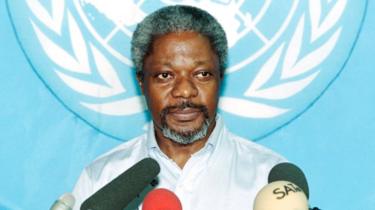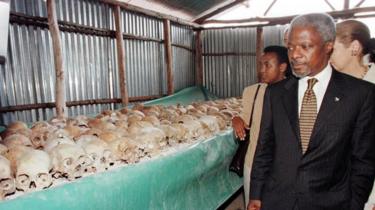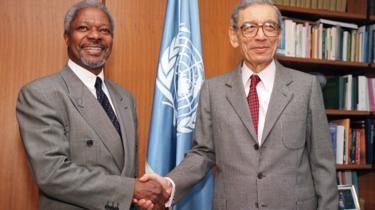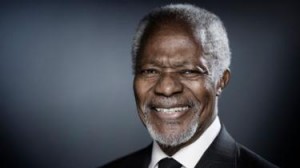Kofi Annan, the international diplomat, dies at 80
It was at his elite boarding school in West Africa that Kofi Annan – the man who would later become the world’s top diplomat – learnt one of his most important lessons.
It was, he said later, “that suffering anywhere concerns people everywhere”.
The idea seems to have inspired Mr Annan throughout a life which saw him play a key role in the crises which have shaped the world, from the HIV/Aids pandemic, to the Iraq War and, latterly, climate change.
His humanitarian work would win him a Nobel Peace Prize, but it would also win him a raft of critics.
Mr Annan, the first black African to lead the United Nations, would nonetheless became one of the most enduring and recognised diplomats in modern history.
Changing times
Kofi Atta Annan and his sister, Efua Atta, were born in the city of Kumasi in what was then Gold Coast in April 1938. The twins’ first names meant “born on a Friday” in Akan, while their shared middle name means “twin”.
He grew up in a wealthy family – his grandfathers were traditional leaders, while his father became a provincial governor – in a country still under British rule.
Then, two days before the future diplomat turned 19, the country finally won its independence, becoming Ghana.
The impact on Mr Annan’s later life cannot be underestimated.
“I walked away as a young man convinced that change is possible, even radical revolutionary change,” Mr Annan told a group in Canada in 2012.
 Image copyrightAFP
Image copyrightAFPAfter studying at university, first in the newly liberated Ghana, followed by Macalester College in the US, he got his first job with the UN.
The position – a budget officer with the World Health Organization (WHO) – gave no hint as to the career he was to have over the next four decades, culminating in 1997 when he was elected secretary-general.
But before he got there, he would face one of the biggest scandals of his career.
Genocide
By 1993, Mr Annan had risen to the post of under secretary-general and head of peacekeeping.
The next year, up to 800,000 ethnic Tutsis and moderate Hutus were massacred in 100 days in Rwanda. Then, in 1995, up to 8,000 Muslims were executed by Serbian forces in a so-called UN safe area in Bosnia.
In both cases, Mr Annan and his department came under fire – especially after it emerged that his department had largely ignored information that had been passed to them, warning that the Rwandan genocide was being planned.
 Image copyrightAFP
Image copyrightAFPOn the 10th anniversary of the genocide, Mr Annan acknowledged his shortcomings.
“I myself, as head of the UN’s peacekeeping department at the time, pressed dozens of countries for troops,” he said in 2004. “I believed at that time that I was doing my best.
“But I realised after the genocide that there was more that I could, and should, have done to sound the alarm and rally support. This painful memory, along with that of Bosnia and Herzegovina, has influenced much of my thinking, and many of my actions, as secretary-general.”
Despite this, in 1997, at the age of 59, Mr Annan would succeed Boutros Boutros-Ghali as UN secretary-general.
Conflict
Mr Annan had inherited an organisation which, after 52 years, was on the brink of bankruptcy.
He set about reforming the institution, cutting 1,000 jobs out of 6,000 positions at the New York headquarters, while also trying to convince reluctant member states to take responsibility for the world’s many tragedies.
Mr Annan also got the US to pay a backlog of debt it owed the UN.
He also turned his attention to the future, establishing the Millennium Goals – an ambitious set of priorities to meet by 2015, from halving extreme poverty rates to halting the spread of HIV/Aids.
But it was not an easy job.
 Image copyrightAFP
Image copyrightAFP“I used to say the letters SG do not stand for secretary-general, they stand for scapegoat,” he told the BBC.
In 2001, Mr Annan and the UN were awarded the Nobel Peace Prize. The citation lauded Mr Annan, the second UN Secretary General to be given the prize, as someone who had brought “new life to the organisation”.
The same year, he was unanimously re-elected for a second term.
But trouble was just around the corner.
Scandal
In 2003, the US – one of Mr Annan’s biggest supporters – announced its intention to go to war in Iraq. In the end, the US bypassed the UN and invaded Iraq with a voluntary coalition.
This drove a wedge between Mr Annan and the superpower. Speaking about the invasion, he later told the BBC: “From our point of view and from the charter point of view, it was illegal.”
This new divide between Mr Annan and the US caused him problems after the “oil for food scandal”, which emerged in 2004, implicated the secretary-general, both professionally and personally.
Source BBC














